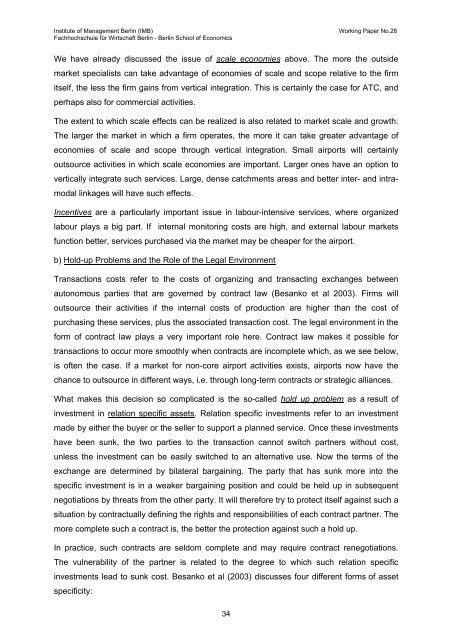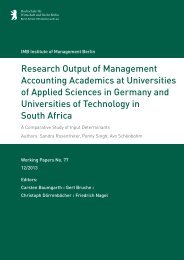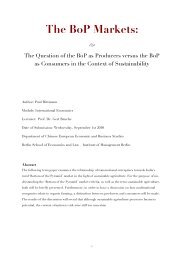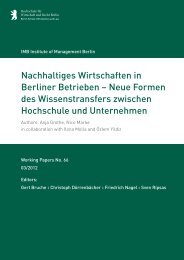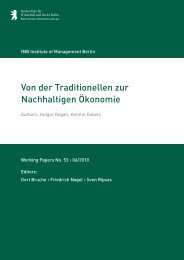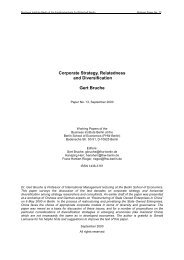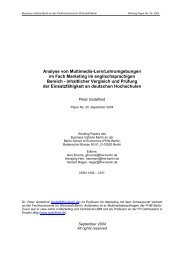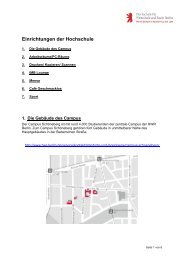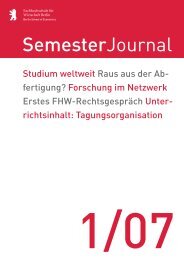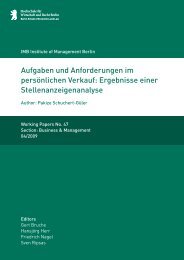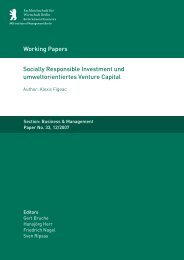Working paper template - MBA Programme der HWR Berlin
Working paper template - MBA Programme der HWR Berlin
Working paper template - MBA Programme der HWR Berlin
You also want an ePaper? Increase the reach of your titles
YUMPU automatically turns print PDFs into web optimized ePapers that Google loves.
Institute of Management <strong>Berlin</strong> (IMB) <strong>Working</strong> Paper No.28<br />
Fachhochschule für Wirtschaft <strong>Berlin</strong> - <strong>Berlin</strong> School of Economics<br />
We have already discussed the issue of scale economies above. The more the outside<br />
market specialists can take advantage of economies of scale and scope relative to the firm<br />
itself, the less the firm gains from vertical integration. This is certainly the case for ATC, and<br />
perhaps also for commercial activities.<br />
The extent to which scale effects can be realized is also related to market scale and growth:<br />
The larger the market in which a firm operates, the more it can take greater advantage of<br />
economies of scale and scope through vertical integration. Small airports will certainly<br />
outsource activities in which scale economies are important. Larger ones have an option to<br />
vertically integrate such services. Large, dense catchments areas and better inter- and intra-<br />
modal linkages will have such effects.<br />
Incentives are a particularly important issue in labour-intensive services, where organized<br />
labour plays a big part. If internal monitoring costs are high, and external labour markets<br />
function better, services purchased via the market may be cheaper for the airport.<br />
b) Hold-up Problems and the Role of the Legal Environment<br />
Transactions costs refer to the costs of organizing and transacting exchanges between<br />
autonomous parties that are governed by contract law (Besanko et al 2003). Firms will<br />
outsource their activities if the internal costs of production are higher than the cost of<br />
purchasing these services, plus the associated transaction cost. The legal environment in the<br />
form of contract law plays a very important role here. Contract law makes it possible for<br />
transactions to occur more smoothly when contracts are incomplete which, as we see below,<br />
is often the case. If a market for non-core airport activities exists, airports now have the<br />
chance to outsource in different ways, i.e. through long-term contracts or strategic alliances.<br />
What makes this decision so complicated is the so-called hold up problem as a result of<br />
investment in relation specific assets. Relation specific investments refer to an investment<br />
made by either the buyer or the seller to support a planned service. Once these investments<br />
have been sunk, the two parties to the transaction cannot switch partners without cost,<br />
unless the investment can be easily switched to an alternative use. Now the terms of the<br />
exchange are determined by bilateral bargaining. The party that has sunk more into the<br />
specific investment is in a weaker bargaining position and could be held up in subsequent<br />
negotiations by threats from the other party. It will therefore try to protect itself against such a<br />
situation by contractually defining the rights and responsibilities of each contract partner. The<br />
more complete such a contract is, the better the protection against such a hold up.<br />
In practice, such contracts are seldom complete and may require contract renegotiations.<br />
The vulnerability of the partner is related to the degree to which such relation specific<br />
investments lead to sunk cost. Besanko et al (2003) discusses four different forms of asset<br />
specificity:<br />
34


